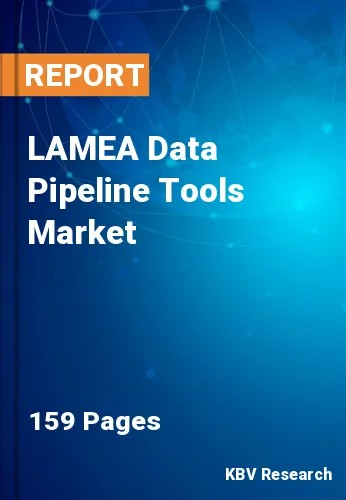The Latin America, Middle East and Africa Data Pipeline Tools Market would witness market growth of 22.6% CAGR during the forecast period (2022-2028).
The data pipeline tools market faces obstacles, such as a lack of standardization within enterprise data pipeline and management strategy, a lack of adoption of high-end ETL tools by small and medium-sized enterprises, and the requirement for an improved data pipeline framework that incorporates a big data platform. The market for data pipeline tools is classified according to components, applications, form, deployment methodologies, organization sizes, industries, and regions.
Data standardization, deduplication, sorting, validation, and verification are examples of transformation operations. The ultimate objective is to make data analysis practicable. There are two data ingestion models, namely batch processing and stream processing. In batch processing, source data is gathered frequently and transmitted to the destination system. The workflow involves the sequencing and control of process dependencies.
Technical or business-focused workflow dependencies can exist. A monitoring component is required for data pipelines to maintain data integrity. Network congestion and inaccessible sources or destinations are examples of potential failure scenarios. The pipeline must have an alerting system for such instances.
The IT industry throughout South Africa is growing in recent years as the penetration of smartphones as well as other smart devices is increasing. South Africa also has one of Africa's biggest markets for information and communications technology. It demonstrates technological dominance in mobile applications, security software, and electronic banking services. As an increasingly significant contribution to South Africa's gross domestic product, the country's ICT as well as electronics sector is both advanced and developing. Multiple multinational corporations have subsidiaries in South Africa. It is regarded as a regional hub and supply center for surrounding nations.
The Brazil market dominated the LAMEA Data Pipeline Tools Market by Country in 2021; thereby, achieving a market value of $349.3 million by 2028. The Argentina market is showcasing a CAGR of 23.3% during (2022 - 2028). Additionally, The UAE market would register a CAGR of 22.3% during (2022 - 2028).
Based on Application, the market is segmented into Real time Analytics & Predictive Maintenance, Customer Experience Management, Sales & Marketing Data, Customer 360 & Customer Relationship Management, Data Migration and Data Traffic Management & Others. Based on Vertical, the market is segmented into BFSI, IT & ITeS, Telecom, Retail & eCommerce, Government & Defense, Healthcare & Life Sciences, Manufacturing, Energy & Utilities, Transportation & Logistics and Others. Based on Deployment Mode, the market is segmented into On-premise and Cloud. Based on Organization Size, the market is segmented into Large Enterprises and SMEs. Based on Component, the market is segmented into Tools and Services. Based on Type, the market is segmented into ETL Data Pipeline, Streaming Data Pipeline, Batch Data Pipeline, ELT Data Pipeline and Change Data Capture (CDC) Pipeline. Based on countries, the market is segmented into Brazil, Argentina, UAE, Saudi Arabia, South Africa, Nigeria, and Rest of LAMEA.
Free Valuable Insights: The Global Data Pipeline Tools Market is Predict to reach $19 Billion by 2028, at a CAGR of 19.4%
The market research report covers the analysis of key stake holders of the market. Key companies profiled in the report include SAP SE, IBM Corporation, Microsoft Corporation, Oracle Corporation (Cerner Corporation), Amazon Web Services, Inc. (Amazon.com, Inc.), Google LLC, Software AG, Snowflake, Inc., Tibco Software, Inc. (Vista Equity Partners) and Precisely (Clearlake Capital Group)
By Application
By Vertical
By Deployment Mode
By Organization Size
By Component
By Type
By Country
Our team of dedicated experts can provide you with attractive expansion opportunities for your business.

